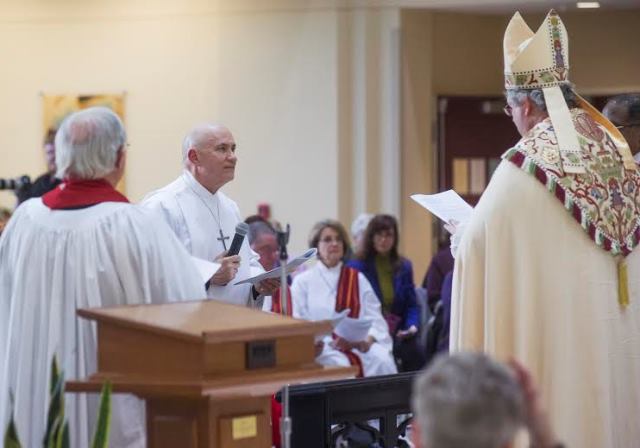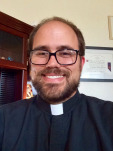By Jeff Brumley
Growing up Southern Baptist in Alabama, Malcom Marler saw just how nasty people can be when they disagree about scripture and thorny theological issues.
The resulting departure of moderates and liberals from the convention in the late 1980s and early 1990s was heartbreaking, he said.
“Primarily my feelings were of sadness and grief that so many people believed we need to be of one mind with all of our interpretation of scripture,” said Marler, the son and grandson of SBC preachers. He was working on his doctorate in ministry at Southern Baptist Theological Seminary when the strife in the convention reached its apex.
“It was a grieving process we all had to go through,” he said. “We knew our church was struggling with schism.”

So it is with a little bit of déjà vu that Marler is experiencing those same emotions as his current spiritual home, the Episcopal Church, may be limited temporarily from full participation in its global organization, the worldwide Anglican Communion.
The communion’s leaders, known as primates, voted by a two-thirds margin last week to censure the U.S. church for its embrace of same-sex marriage and other issues. In a Jan. 14 statement, primates insisted that for “a period of three years the Episcopal Church no longer represents us on ecumenical and interfaith bodies, should not be appointed or elected to an internal standing committee and that while participating in the internal bodies of the Anglican Communion, they will not take part in decision making on any issues pertaining to doctrine or polity.”
Some Anglican leaders, both in the United States and in other countries, question whether the primates have authority to impose the restrictions. A definitive decision may be up to the Anglican Consultative Council, which coordinates the work of the communion.
The action is a response to the Episcopal Church’s July vote to permit clergy to perform gay marriages. The primates said the majority of churches in the communion maintain that the biblical view of marriage is between one man and one woman.
Also cited were earlier Episcopal Church moves toward full inclusion of homosexuals, including the election of gay and lesbian bishops dating back to 2003.
“All of us acknowledge that these developments have caused further deep pain throughout our Communion,” the primates said in their statement.
Feelings of sadness
The disagreement has much in common with the troubles that once beset the SBC, said Marler, director of pastoral care for UAB Medicine in Birmingham, Ala.
And for him, it’s emotional.
“As a pastoral guy I would say this is more of a feeling than a theological argument,” he said.
And that feeling is sadness, Marler said.
“It’s the feeling I share any time we start trying to ensure everybody has the same theological interpretation of scripture.”
But those feelings were not enough to drive Marler from the Baptist family. He was a member of the Baptist Church of the Covenant, a Cooperative Baptist Fellowship congregation in Birmingham, for several years before changing denominations.
Later he and his formerly Catholic wife left that congregation for the Episcopal Church. Both eventually became priests and Marler now serves as an associate in the parish where she is rector.
Marler said he was impressed with the Episcopal Church and Anglican Communion for their tradition of ministering together despite differences.
That’s the same lesson taught on the parish-level on all manner of issues, including same-sex marriage, he said.
“We don’t all have to agree on everything.”
“We can have broad discussions,” he said. “But what really binds us together in this community is the communion we have around Christ.”
‘Cause for hope’
It’s a different feeling for Chris Adams, a Southern Baptist-turned-Episcopalian.
 “It doesn’t cause me anger, but certainly frustration,” he said of the primates’ censure of the Episcopal Church.
“It doesn’t cause me anger, but certainly frustration,” he said of the primates’ censure of the Episcopal Church.
Adams, rector of a parish in Los Alamos, N.M., said it wasn’t the SBC controversies that led him eventually to the Episcopal Church. But he does remember, as a high school student, how the topic was upsetting to many he knew and loved.
“I grew up Southern Baptist in Texas the first half of my life, so my family has Southern Baptist DNA,” he said, adding that his grandparents and father had been international missionaries.
Adams said he knows fundamentalism when he sees it.
“The first time I heard about the Episcopal Church was in a lesson about the heresy of modernism,” he recalled from his days at a conservative Christian high school.
“I would leave saying that’s not my experience of people with differing interpretations” of scripture, he said. “The idea that there is one line for scripture — I never quite bought it.”
He went on to become a Baptist minister and eventually to be minister to students at First Baptist Church in Wilmington, N.C. He left there for another year at seminary before ordination as an Episcopal priest in 2013.
Conflicting worldviews
Today, Adams said he sees the rift between the Anglican Communion and the Episcopal Church as a difference in worldviews.
“The Episcopal Church is not being shaped by culture, but is finding ways to be authentic in a changing North American context,” he said.
In some nations where a Western intellectual mindset isn’t shared, that’s seen very differently, he said.
“They have a different way of interpreting scripture and a fundamentally different way of seeing the world.”
Adams said he disagrees with the primates’ action and feels they are inappropriate because churches in the Anglican Communion are independent and self-governing.
“I don’t think they have the authority to do that,” he said of the primates.
He added that Episcopalians who feel their church is being unfairly treated should remember the Episcopal Church was given warnings for years to cease its advances in marriage equality to give the communion time to study the issue.
“We made a clear choice and knew that these consequences could happen.”
But even if those restrictions are implemented, he isn’t worried.
“I’m not afraid of a breakup,” he said. “If it was going to happen, it would have happened already.”
But there is another reason to be optimistic, he said.
During the primates’ meeting in England, they expressed a “unanimous desire to walk together” despite the current disagreements centered around same-sex marriage.
“That actually gave me cause for hope.”
